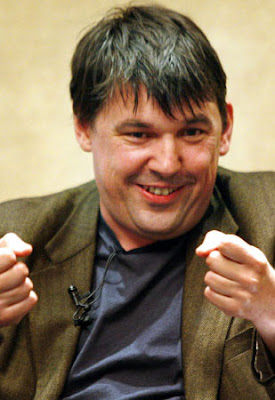This post is written
by our monthly
correspondent,
Lee Liberman
Fagin’s (Anton Lesser, far right, above) den where he recruits boys to become pick pockets is nearby. Same for the home of the Barbary sisters, Frances and Honoria, and Satis House, the Havisham residence. It happens here that Amelia Havisham and Honoria Barbary are best friends as young women, both having great expectations, only to join the long-suffering. We know from the novel that Miss Havisham was betrayed and spent her mature years holding court at her grimy wedding table dressed in her decayed wedding dress. But our gothic Dickensian is the made-up prequel to all that; here she is a young beauty (Tuppence Middleton, of Downton Abbey, Mank) who shines with demure confidence as she helms her father’s company, tho we are sorry to watch her half-brother Arthur Havisham, (Joseph Quinn, Howard’s End) decompensate in self-hate and are filled with dread at her adoration of the duplicitous Meriwether Compeyson (Tom Weston-Jones of World Without End, Copper), below, knowing what is to follow.
Three main plots weave through the 10 episodes of Dickensian. One is the inventive backstory of Miss Havisham who has been fixed in our memory as the man-hating, jilted bride. Second is the tale of Bleak House’s heart-warming Honoria Barbary, in love with young Captain Hawdon (below), but here on a soul-killing journey to wed dreary Sir Leicester Deadlock at the connivance of her jealous sister. (Honoria, Sophie Rundle of Peaky Blinders and Gentleman Jack, is not lauded enough; she is as good a tough mob moll as she is a tragic heroine).
The third story is the mystery of who killed Jacob Marley (Peter Firth) of ‘A Christmas Carol’ (‘Marley was dead to begin with’) that is adjudicated by lawyer Jaggers (fine character actor, John Heffernan) and investigated throughout by terribly decent Inspector Bucket of Bleak House, until all possible suspects have been ruled out except the least likely one. The dutiful-inspector task falls to the impeccable Stephen Rea (below, of The Crying Game, Interview with a Vampire, The Company of Wolves) whose mobile face and precise articulation is perfect as a good Dickensian, just perfect, in a nod to the start of dedicated police investigation.
Subplots involve miserly Mr. Scrooge, Ned Dennehy (Peaky Blinders, Outlander), who is deliciously bad and all too far from redemption here, and the impoverished, put-upon Cratchit family, including the now renown Phoebe Dynevor (below, of Bridgerton, now filming season 2) as pretty young Martha Cratchit (below).
Comic relief is supplied by the Bumbles, Madam Scold and her toadie Mister who run the children’s workhouse without an ounce of kindness or common sense (below)
and by Pauline Collins (below) who has had a long career as a character actress beginning with the vamp who seduced the rich young master in the original Upstairs, Downstairs (1971-73). Collins, now past 80, plays the tippling Mrs. Gamp here, in a satiric take on the terrible state of nursing pre-Florence Nightingale.
These (and more) groundlings are clever but tiresome on repeat; Tony Jordan’s wallow in Dickensian caricature adds length without depth. (An adorer of the theater, Dickens was an actor and mimic, from which came his enduring comic characters.) At the other extreme, screen-writer Jordan (below) was much more successful in harnessing our emotions to the pain of betrayal and loss suffered by the two heroines, Honoria and Miss Havisham, in contrast to Dickens, himself, whose female characters could be tiresomely mad or bad. Some prudent cuts might have helped save Dickensian from the chopping block. One has to wait too long for the good parts — the more emotional parts. After its run in 2015-16, the series was not picked up for renewal, sadly for the loss of many delights within. (That's Mr. Jordan, below.)
Charles Dickens himself (1812-1870), buried in Poet’s Corner, Westminster Abbey, was one of England’s most successful novelists during his lifetime and posthumously — much has been written that describes his life and motivations. He was more of a social and political critic (in tune with today’s democratic left) than a conveyor of deep sensibility or psychological depth. His characters are more cartoon-like than real but invented to castigate the aristocracy, the rising merchant class, and the exploitation of the working poor. He popularized serial storytelling in newspapers — streaming TV leaps right off the pages of the Dickens playbook. He mined his own life experience such as his father’s stay in debtors’ prison that became the work-house setting in ‘Little Dorrit’ and his own 10-hour days as a child in a boot-blacking factory leading to indignation that working class children endured such. He is quoted in a New York speech: “Virtue shows quite well in rags and patches as she does in purple and fine linen.”
The unfeeling treatment of Dickens by his mother is thought to be the cause of some grimly unpleasant women in the Dickens lexicon. He himself was flighty in love (though not particularly so by today’s standards). He tired of his wife or they of each other, separating households after 10 children, divorce being unthinkable then, falling in love with a young actress kept hidden from the public. He supported them all — wife, mistress, children, servants— not to mention being widely known otherwise for his kindness and philanthropy. Dickens was prodigious in his short lifetime (58 years) but we don’t revisit him for interiority; instead he is beloved for verbal genius, memorable characters, and observations about social ills that repeat back on us today like indigestion. To purists who would have no meddling with the work of an original, I say never mind, just enjoy this evanescent Dickens for the nostalgia and the pleasure of re-imaginings.





















































